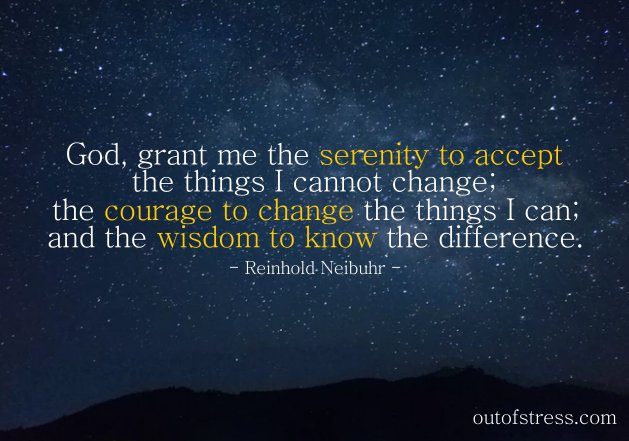One day when I was teaching a yoga class, some construction workers were using a jack hammer outside during the duration of the class. It did not matter how high I turned up the music, the jack hammer was louder. It felt impossible to create the state of Zen and peace that yoga often elicits.
I invited the class to be mindful that life often hits us with experiences that provoke the same anxiety we felt listening to the jack hammer.
Mindfulness helps us to do a better job of calming our body and mind in the midst of anxiety. So I encouraged the class to stay with their breath and the present moment, in order to experience as much peace as possible, in the midst of the chaotic sound the jack hammer was making.
At times during this yoga class, we just had to laugh about the jack hammer. It was annoying, but there was nothing we could do about it. This experience reminded me that how someone handles anxiety on their yoga mat, correlates with how they will experience the stressors of life off the mat.
The unexpected pounding jack hammer reminded me of one of my favorite prayers written by Reinhold Niebuhr, known as The Serenity Prayer. It says, “God grant me the serenity to accept the things I cannot change; courage to change the things I can; and wisdom to know the difference.”
If we have attended a 12-Step group, such as Alcoholics Anonymous we may know this prayer, as the group mantra at the end of the meeting. We find freedom and peace when we are able to differentiate between what we can and can’t control.
“God Grant Me the Serenity..”
Most of us have an innate sense that there is a power bigger than us that can help us find peace and contentment in the midst of the pressures of life.
Whether you call God your Higher Power, Great Spirit, Creator, or Life Force, many of us believe that there is a divine energy in this world that is difficult to explain, but that we feel and know.
When we rest in this Presence, we can experience peace, hope, freedom and life.
We also intuit that God has us here on this journey to grow and learn, and as we connect to our higher power through prayer and meditation, we ask for help in discerning what we can and can’t control.
“..To Accept the Things I Cannot Change..”
So often we think we can change things that are truly out of our governing power.
As a child I desperately wanted to control my dad’s drinking habit. He had a problem with alcohol, and I can remember dumping out his beer cans several times to make the point to him that he needed to make a change in his life.
Looking back, it was important for me to be bold and challenge my dad in this way, but I now know that only he had the power to recognize his need to make a change in his life. It was in my power to tell my dad in literal and symbolic ways that I needed him to change, but it was not in my power to make this change for him.
Often when we are in a romantic relationship, we find ourselves wanting to change something about our partner. We want our loved one to eat like we do, share our exact religious perspective, and have the same habits.
Essentially, we want our partner to be perfect. We might try to shame them and make them change. Usually when we are trying to control someone, we are using the word “you.” We start to point the finger at our partner, because we long for control and falsely believe we hold truth in our hand.
Someone once wisely said, “When you point one finger, there are three fingers pointing back to you.” Sometimes, I forget about the three fingers pointing back at me, because it seems easier to change my husband, than it does to change myself.
I am not only a child of a recovering alcoholic, who loves to help and fix people, but I am also an eldest sister of two brothers. If there was ever a recipe for a control freak, it would probably involve these ingredients.
So when I am at my worst, I can be stubborn and manipulative and like many of you, I sometimes want to control people and situations that are completely out of my control. But when I opt for control, serenity and self-growth elude me.
“..The Courage to Change the Things I Can..”
Obviously, I had no control over the penetrating noise of the jack hammer that took my yoga class by surprise. But what I could control was my response to the jack hammer.
I took some deep breaths, recognized my lack of control, and chose to laugh about this unanticipated situation. Often, in some situations, all we can control is ourselves.
But I certainly don’t want to argue that we have no sense of agency in this world. Sometimes an issue like global warming seems so out of control that we decide this is a matter we just can’t change. In actuality, there is a great deal we can do to change global warming. We can write our government representatives, recycle, use LED lights and utilize less water. We need to exercise courage to change the things we can.
When we are in a romantic or platonic relationship, we sometimes change the things we can by telling our loved one what we need from them, but we must make sure we do this without trying to control them. It is also wise to not assume that our loved one is the only one who needs to change. Maybe our partner numbs their pain through drinking too much, but perhaps we stifle our hurts through shopping.
When we try to demonize or victimize someone, we are trying to implement control and tell someone what they “should do.” We often try to control others because of our own issues with fear, perfection and inadequacy.
When we judge and control one another, it is because of our own fear that we are not enough. And when we try to get someone to change, we also waste precious time that we could be changing something about us, instead of demonizing our loved one.
Sometimes it is imperative and brave to tell our loved one how their behavior is affecting us. But how can we do this in a way that we are not pointing a finger? The best way to approach someone who is hurting us is to tell them using an I-statement and avoiding You-statements. You-statements are a means of getting the gun out to shoot our loved one. Once we shoot them, they shut down and they can’t hear us.
But if we use I-statements, we might convince our loved one there is some merit to our feelings. Here are some examples of I-statements and You-statements:
You-statement: You are so inconsiderate to be late for dinner. Your works comes before the children.
I-statement: I miss you when get home late. I appreciate how hard you are working for all of us, but having our family time means a great deal to me.
You-statement: You never call me these days. Am I not important to you anymore?
I-statement: I miss our talks. I know you have been busy lately, but I look forward to reconnecting on the phone more when time allows.
Are we aware of the difference between the I-statements and You-statements? You-statements are filled with a need to shame and control a loved one. On the other, the I-statements are an opportunity for someone to own their own feelings without making any demands.
When we try to control someone who is hurting us, the irony is that we can end up being emotionally manipulative and abusive to our perpetrator, if we are not extremely careful. We can be clear with someone about what we need from them, without trying to control them.
If our loved one is not willing to change than we might have to make some courageous choices for our self about how to navigate the relationship.
“..And the wisdom to know the difference..”
Are there any situations or people in your life that you have been trying to control? Sometimes we may face a situation and recognize there are aspects of it we can control and other parts of it that are out of our control.
The wisdom to know the difference is the liminal place where we find peace and serenity.
For example, this week I realized my cat had created a hole in a wingback chair that I recently had reupholstered. I was mad as I thought of the money we had spent on the chair, but then I immediately realized that this was something that had already happened that I could not control. I took a moment to process what I could control in this situation, and realized what is in my control is the ability to cut back our cat’s claws since they have gotten too long recently. I also could change things through buying my cat a new scratch post.
But I had to let go of what happened to the chair and remind myself that I love my cat more than I love the chair. Now when I look at the tear in the fabric, it is a reminder to me that the affection I have for my cat, is more important than a perfect chair.
Sure, I am going to try to minimize the damage to the furniture in our home by doing a better job cutting our cat’s claws, but I also must realize that furniture with scratches are part of what it means to be an owner of a beloved cat. I would rather have my cat’s purrs and love than a perfect home.
When we stop trying to fix, judge, change and control people and situations, we find freedom, connection, peace and life.
I hope you recognize the power of The Serenity Prayer, as a tool to help you discern what you can and cannot control in your life. The wisdom of this prayer can help us recognize what we can and can’t change, when we encounter the unexpected jack hammer, the addict in our family, a significant other who is driving us crazy or the family pet who is destroying parts of our home.








